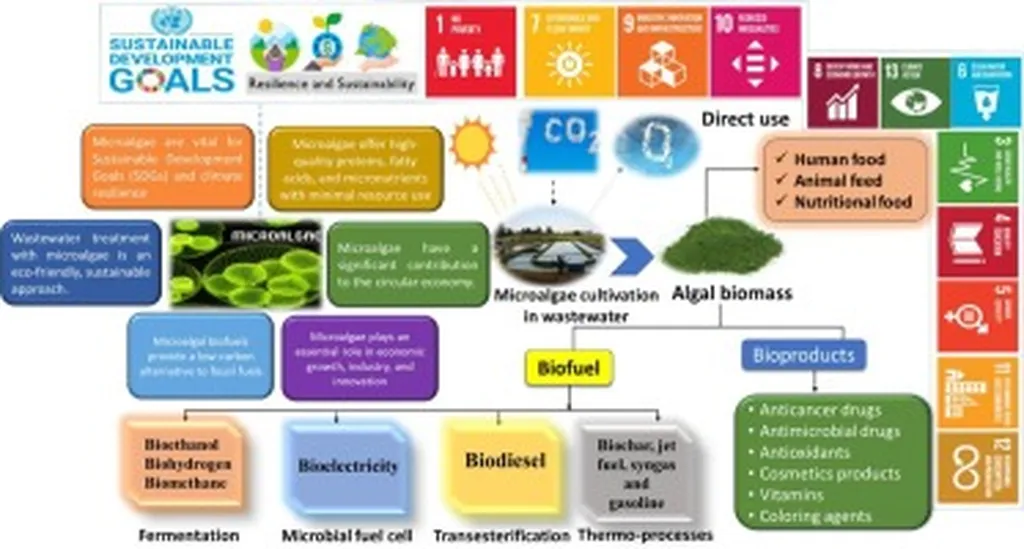In the quest for sustainable solutions to global challenges, algae have emerged as a versatile and promising resource. A recent study published in *Frontiers in Bioengineering and Biotechnology* (translated as “Frontiers in Bioengineering and Biotechnology”) explores how these humble organisms can tackle issues ranging from climate change to energy security. Led by Bishnu Dev Das from the Department of Botany at Mahendra Morang Adarsh Multiple Campus in Biratnagar, Nepal, the research highlights the multifaceted potential of algae in addressing key sustainability challenges.
Algae, particularly species like Chlorella, Nannochloropsis, Botryococcus, and Spirulina, are efficient in biomass production, carbon sequestration, nutrient recycling, and bioenergy generation. The study evaluates recent advances in algal-based wastewater remediation, biodiesel production, and circular bioeconomy strategies. One notable finding is the high potential of Chlorella sorokiniana for phycoremediation and biodiesel yield when cultivated in abattoir wastewater digestate (AWD). This process can achieve up to 90% replacement of conventional biomass media, enhancing lipid and carotenoid content.
“Algae offer a sustainable and adaptable resource that can help with several global issues, including resource depletion, environmental degradation, food security, climate change, and energy security,” says Das. The study also highlights the valorization of crude glycerol via microbial and insect-based systems, underscoring algae’s role in supporting low-carbon bioeconomies.
In agriculture, macroalgae such as Asparagopsis taxiformis have significantly reduced enteric methane emissions in livestock, demonstrating their utility in climate-smart farming. Despite these advances, the scalability and economic viability of algal technologies remain constrained by high production costs, energy-intensive processing, contamination risks, and regulatory limitations.
The research advocates for targeted research into cost reduction, process optimization, and harmonized policy frameworks to unlock algae’s full potential. By addressing these challenges, algae can become central to sustainable development strategies, enabling effective transitions toward cleaner energy, healthier ecosystems, and resilient food systems.
The implications for the energy sector are profound. As the world seeks to reduce its reliance on fossil fuels, algae-based biofuels offer a promising alternative. The ability of algae to grow rapidly and efficiently in various environments, including wastewater, makes them an attractive option for sustainable energy production. Moreover, the integration of industrial waste streams into algal cultivation processes can further enhance the economic viability of these technologies.
This research not only highlights the potential of algae but also underscores the need for continued innovation and investment in this field. As Das notes, “Algae have the potential to revolutionize the way we approach sustainability challenges, but we need to address the existing barriers to make this a reality.”
In the coming years, we can expect to see significant advancements in algal-based technologies, driven by ongoing research and development. The energy sector, in particular, stands to benefit from these innovations, as algae-based biofuels and other applications become more scalable and economically viable. By embracing these technologies, we can move closer to a sustainable future, where energy production is not only cleaner but also more resilient and adaptable to the challenges of a changing world.

